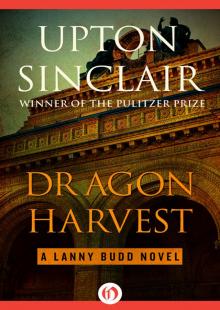- Home
- Upton Sinclair
Sylvia's Marriage Page 4
Sylvia's Marriage Read online
Page 4
caught a glimpse of my husband's face!"
12. I did not hear these stories all at once. I have put them
together here because they make a little picture of her honeymoon,
and also because they show how, without meaning it, she was giving
me an account of her husband.
There had been even fewer adventures in the life of young Douglas
van Tuiver than in the life of the Honourable Reginald Annersley.
When one heard the details of the up-bringing of this "millionaire
baby," one was able to forgive him for being self-centred. He had
grown into a man who lived to fulfil his social duties, and he had
taken to wife a girl who was reckless, high-spirited, with a streak
of almost savage pride in her.
Sylvia's was the true aristocratic attitude towards the rest of the
world. It could never have occurred to her to imagine that anywhere
upon the whole earth there were people superior to the Castlemans of
Castleman County. If you had been ignorant enough to suggest such an
idea, you would have seen her eyes flash and her nostrils quiver;
you would have been enveloped in a net of bewilderment and
transfixed with a trident of mockery and scorn. That was what she
had done in her husband-hunt. The trouble was that van Tuiver was
not clever enough to realise this, and to trust her prowess against
other beasts in the social jungle.
Strange to me were such inside glimpses into the life of these two
favourites of the gods! I never grew weary of speculating about
them, and the mystery of their alliance. How had Sylvia come to make
this marriage? She was not happy with him; keen psychologist that
she was, she must have foreseen that she would not be happy with
him. Had she deliberately sacrificed herself, because of the good
she imagined she could do to her family?
I was beginning to believe this. Irritated as she was by the solemn
snobberies of van Tuiver's world, it was none the less true that she
believed in money; she believed in it with a faith which appalled me
as I came to realise it. Everybody had to have money; the social
graces, the aristocratic virtues were impossible without it. The
rich needed it--even the poor needed it! Could it be that the proud
Castlemans of Castleman County had needed it also?
If that guess at her inmost soul was correct, then what a drama was
her meeting with me! A person who despised money, who had proven it
by grim deeds--and this a person of her own money-worshipping sex!
What was the meaning of this phenomenon--this new religion that was
challenging the priesthood of Mammon? So some Roman consul's
daughter might have sat in her father's palace, and questioned in
wonder a Christian slave woman, destined ere long to face the lions
in the arena.
The exactness of this simile was not altered by the fact that in
this case the slave woman was an agnostic, while the patrician girl
had been brought up in the creed of Christ. Sylvia had long since
begun to question the formulas of a church whose very pews were
rented, and whose existence, she declared, had to be justified by
charity to the poor. As we sat and talked, she knew this one thing
quite definitely--that I had a religion, and she had none. That was
the reason for the excitement which possessed her.
Nor was that fact ever out of my own mind for a moment. As she sat
there in her sun-flooded morning-room, clad in an exquisite
embroidered robe of pink Japanese silk, she was such a lovely thing
that I was ready to cry out for joy of her; and yet there was
something within me, grim and relentless, that sat on guard, warning
me that she was of a different faith from mine, and that between
those two faiths there could be no compromise. Some day she must
find out what I thought of her husband's wealth, and the work it was
doing in the world! Some day she must hear my real opinion of the
religion of motor-cars and hand-woven carpets!
13. Nor was the day so very far off. She sat opposite me, leaning
forward in her eagerness, declaring: "You must help to educate me. I
shall never rest until I'm of some real use in the world."
"What have you thought of doing?" I inquired.
"I don't know yet. My husband has an aunt who's interested in a
day-nursery for the children of working-women. I thought I might
help this, but my husband says it does no good whatever--it only
makes paupers of the poor. Do you think so?"
"I think more than that," I replied. "It sets women free to compete
with men, and beat down men's wages."
"Oh, what a puzzle!" she exclaimed, and then: "Is there any way of
helping the poor that wouldn't be open to the same objection?"
That brought us once more to the subject I had put aside at our last
meeting. She had not forgotten it, and asked again for an
explanation. What did I mean by the competitive wage system?
My purpose in this writing is to tell the story of Sylvia
Castleman's life, to show, not merely what she was, but what she
became. I have to make real to you a process of growth in her soul,
and at this moment the important event is her discovery of the
class-struggle and her reaction to it. You may say, perhaps, that
you are not interested in the class-struggle, but you cannot alter
the fact that you live in an age when millions of people are having
the course of their lives changed by the discovery of it. Here, for
instance, is a girl who has been taught to keep her promises, and
has promised to love, honour and obey a man; she is to find the task
more difficult, because she comes to understand the competitive
wage-system while he does not understand it and does not wish to.
If that seems to you strange material out of which to make a
domestic drama, I can only tell you that you have missed some of the
vital facts of your own time.
I gave her a little lesson in elementary economics. I showed her
how, when a capitalist needed labour, he bought it in the open
market, like any other commodity. He did not think about the human
side of it, he paid the market-price, which came to be what the
labourer had to have in order to live. No labourer could get more,
because others would take less.
"If that be true," I continued, "one of the things that follows is
the futility of charity. Whatever you do for the wage-worker on a
general scale comes sooner or later out of his wages. If you take
care of his children all day or part of the day, he can work for
less; if he doesn't discover that someone else does, and underbids
him and takes his place. If you feed his children at school, if you
bury him free, if you insure his life, or even give him a dinner on
Christmas Day, you simply enable his landlord to charge him more, or
his employer to pay him less."
Sylvia sat for a while in thought, and then asked: "What can be done
about such a fact?"
"The first thing to be done is to make sure that you understand it.
Nine-tenths of the people who concern themselves with social
questions don't, and
so they waste their time in futilities. For
instance, I read the other day an article by a benevolent old
gentleman who believed that the social problem could be solved by
teaching the poor to chew their food better, so that they would eat
less. You may laugh at that, but it's not a bit more absurd than the
idea of our men of affairs, that the thing to do is to increase the
efficiency of the workers, and so produce more goods."
"You mean the working-man doesn't get more, even when he produces
more?"
"Take the case of the glass factories. Men used to get eight dollars
a day there, but someone invented a machine that did the work of a
dozen men, and that machine is run by a boy for fifty cents a day."
A little pucker of thought came between her eyes. "Might there not
be a law forbidding the employer to reduce wages?"
"A minimum wage law. But that would raise the cost of the product,
and drive the trade to another state."
She suggested a national law, and when I pointed out that the trade
would go to other countries, she fell back on the tariff. I felt
like an embryologist--watching the individual repeating the history
of the race!
"Protection and prosperity!" I said, with a smile. "Don't you see
the increase in the cost of living? The working-man gets more money
in his pay envelope, but he can't buy more with it because prices go
up. And even supposing you could pass a minimum wage law, and stop
competition in wages, you'd only change it to competition in
efficiency--you'd throw the old and the feeble and the untrained
into pauperism."
"You make the world seem a hard place to live in," protested Sylvia.
"I'm simply telling you the elementary facts of business. You can
forbid the employer to pay less than a standard wage, but you can't
compel him to employ people who aren't able to earn that wage. The
business-man doesn't employ for fun, he does it for the profit there
is in it."
"If that is true," said Sylvia, quickly, "then the way of employing
people is cruel."
"But what other way could you have?"
She considered. "They could be employed so that no one would make a
profit. Then surely they could be paid enough to live decently!"
"But whose interest would it be to employ them without profit?"
"The State should do it, if no one else will."
I had been playing a game with Sylvia, as no doubt you have
perceived. "Surely," I said, "you wouldn't approve anything like
that!"
"But why not?"
"Because, it would be Socialism."
She looked at me startled. "Is that Socialism?"
"Of course it is. It's the essence of Socialism."
"But then--what's the harm in it?"
I laughed. "I thought you said that Socialism was a menace, like
divorce!"
I had my moment of triumph, but then I discovered how fond was the
person who imagined that he could play with Sylvia. "I suspect you
are something of a Socialist yourself," she remarked.
She told me a long time afterwards what had been her emotions during
these early talks. It was the first time in her life that she had
ever listened to ideas that were hostile to her order, and she did
so with tremblings and hesitations, combating at every step an
impulse to flee to the shelter of conventionality. She was more
shocked by my last revelation than she let me suspect. It counted
for little that I had succeeded in trapping her in proposing for
herself the economic programme of Socialism, for what terrifies her
class is not our economic programme, it is our threat of
slave-rebellion. I had been brought up in a part of the world where
democracy is a tradition, a word to conjure with, and I supposed
that this would be the case with any American--that I would only
have to prove that Socialism was democracy applied to industry. How
could I have imagined the kind of "democracy" which had been taught
to Sylvia by her Uncle Mandeville, the politician of the family, who
believed that America was soon to have a king, to keep the "foreign
riff-raff" in its place!
14. At this time I was living in a three-roomed apartment in one of
the new "model tenements" on the East Side. I had a saying about the
place, that it was "built for the proletariat and occupied by
cranks." What an example for Sylvia of the futility of charity--the
effort on the part of benevolent capitalists to civilise the poor by
putting bath-tubs in their homes, and the discovery that the
graceless creatures were using them for the storage of coals!
Having heard these strange stories, Sylvia was anxious to visit me,
and I was, of course, glad to invite her. I purchased a fancy brand
of tea, and some implements for the serving of it, and she came, and
went into raptures over my three rooms and bath, no one of which
would have made more than a closet in her own apartments. I
suspected that this was her Southern _noblesse oblige_, but I knew
also that in my living room there were some rows of books, which
would have meant more to Sylvia van Tuiver just then than the
contents of several clothes-closets.
I was pleased to discover that my efforts had not been wasted. She
had been thinking, and she had even found time, in the midst of her
distractions, to read part of a book. In the course of our talks I
had mentioned Veblen, and she had been reading snatches of his work
on the Leisure Class, and I was surprised, and not a little amused,
to observe her reaction to it.
When I talked about wages and hours of labour, I was dealing with
things that were remote from her, and difficult to make real; but
Veblen's theme, the idle rich, and the arts and graces whereby they
demonstrate their power, was the stuff of which her life was made.
The subtleties of social ostentation, the minute distinctions
between the newly-rich and the anciently-rich, the solemn
certainties of the latter and the quivering anxieties of the
former--all those were things which Sylvia knew as a bird knows the
way of the wind. To see the details of them analysed in learned,
scientific fashion, explained with great mouthfuls of words which
one had to look up in the dictionary--that was surely a new
discovery in the book-world! "Conspicuous leisure!" "Vicarious
consumption of goods!" "Oh, de-ah me, how que-ah!" exclaimed Sylvia.
And what a flood of anecdotes it let loose! A flood that bore us
straight back to Castleman Hall, and to all the scenes of her young
ladyhood! If only Lady Dee could have revised this book of Veblen's,
how many points she could have given to him! No details had been too
minute for the technique of Sylvia's great-aunt--the difference
between the swish of the right kind of silk petticoats and the wrong
kind; and yet her technique had been broad enough to take in a
landscape. "Every girl should have a background," had been one of
her maxims, and Sylvia had to have a special phaeton to drive, a
special horse to ride, special roses which no on
e else was allowed
to wear.
"Conspicuous expenditure of time," wrote Veblen. It was curious,
said Sylvia, but nobody was free from this kind of vanity. There was
dear old Uncle Basil, a more godly bishop never lived, and yet he
had a foible for carving! In his opinion the one certain test of a
gentleman was the ease with which he found the joints of all kinds
of meat, and he was in arms against the modern tendency to turn such
accomplishments over to butlers. He would hold forth on the subject,
illustrating his theories with an elegant knife, and Sylvia
remembered how her father and the Chilton boys had wired up the
joints of a duck for the bishop to work on. In the struggle the
bishop had preserved his dignity, but lost the duck, and the
bishop's wife, being also high-born, and with a long line of
traditions behind her, had calmly continued the conversation, while
the butler removed the smoking duck from her lap!
Such was the way of things at Castleman Hall! The wild, care-free
people--like half-grown children, romping their way through life!
There was really nothing too crazy for them to do, if the whim
struck them. Once a visiting cousin had ventured the remark that she
saw no reason why people should not eat rats; a barn-rat was clean
in its person, and far choicer in its food than a pig. Thereupon
"Miss Margaret" had secretly ordered the yard-man to secure a
barn-rat; she had had it broiled, and served in a dish of squirrels,
and had sat by and watched the young lady enjoy it! And this, mind
you, was Mrs. Castleman of Castleman Hall, mother of five children,
and as stately a dame as ever led the grand march at the Governor's
inaugural ball! "Major Castleman," she would say to her husband,
"you may take me into my bedroom, and when you have locked the door
securely, you may spit upon me, if you wish; but don't you dare even
to _imagine_ anything undignified about me in public!"
15. In course of time Sylvia and I became very good friends. Proud
as she was, she was lonely, and in need of some one to open her
eager mind to. Who was there safer to trust than this plain Western
woman, who lived so far, both in reality and in ideas, from the
great world of fashion?
Before we parted she considered it necessary to mention my
relationship to this world. She had a most acute social conscience.
She knew exactly what formalities she owed to everyone, just when
she ought to call, and how long she ought to stay, and what she
ought to ask the other person to do in return; she assumed that the
other knew it all exactly as well, and would suffer if she failed in
the slightest degree.
So now she had to throw herself upon my mercy. "You see," she
explained, "my husband wouldn't understand. I may be able to change
him gradually, but if I shock him all at once--"
"My dear Mrs. van Tuiver--" I smiled.
"You can't really imagine!" she persisted. "You see, he takes his
social position so seriously! And when you are conspicuous--when
everybody's talking about what you do--when everything that's the
least bit unusual is magnified--"
"My dear girl!" I broke in again. "Stop a moment and let me talk!"
"But I hate to have to think--"
"Don't worry about my thoughts! They are most happy ones! You must
understand that a Socialist cannot feel about such things as you do;
we work out our economic interpretation of them, and after that they
are simply so much data to us. I might meet one of your great
friends, and she might snub me, but I would never think she had
snubbed _me_--it would be my Western accent, and my forty-cent hat,
and things like that which had put me in a class in her mind. My
real self nobody can snub--certainly not until they've got at it."
"Ah!" said Sylvia, with shining eyes. "You have your own kind of
aristocracy, I see!"

 Prince Hagen
Prince Hagen Dragon Harvest
Dragon Harvest The Jungle
The Jungle Sylvia's Marriage
Sylvia's Marriage Oil! A Novel by Upton Sinclair
Oil! A Novel by Upton Sinclair The Coal War: A Novel
The Coal War: A Novel Presidential Agent
Presidential Agent World's End
World's End The Second-Story Man
The Second-Story Man O Shepherd, Speak!
O Shepherd, Speak! Wide Is the Gate
Wide Is the Gate The Return of Lanny Budd
The Return of Lanny Budd One Clear Call I
One Clear Call I 100%: the Story of a Patriot
100%: the Story of a Patriot The Machine
The Machine Presidential Mission
Presidential Mission A Cadet's Honor: Mark Mallory's Heroism
A Cadet's Honor: Mark Mallory's Heroism Between Two Worlds
Between Two Worlds World's End (The Lanny Budd Novels)
World's End (The Lanny Budd Novels) Between Two Worlds (The Lanny Budd Novels)
Between Two Worlds (The Lanny Budd Novels) The Coal War
The Coal War Presidential Agent (The Lanny Budd Novels)
Presidential Agent (The Lanny Budd Novels) Oil (filmed as There Will Be Blood)
Oil (filmed as There Will Be Blood) Wide Is the Gate (The Lanny Budd Novels)
Wide Is the Gate (The Lanny Budd Novels)